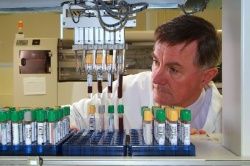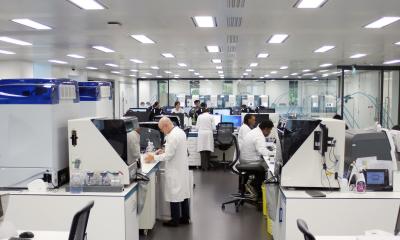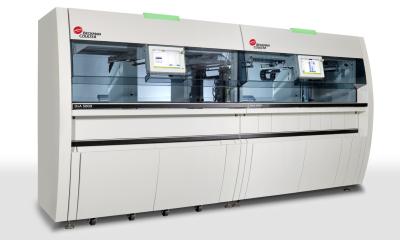Partnership delivers improvements in pathology services
Dr John Wood, Head of Pathology, Southampton University Hospitals, UK, describes how the hospital boosted productivity by 97% after automating its entire laboratory process – and is now part of an expanding NHS network
Southampton University Hospitals’ Department of Laboratory Medicine has recently transformed the way it delivers its pathology service, becoming one of the largest automation installations in the National Health Service to operate under a managed service contract. This has contributed significantly to the development of a strengthened and expanded pathology network across Southern England.


As well as serving the community of 500,000 people in Southampton and South West Hampshire, the 1,300-bed hospital is also a tertiary referral centre — providing specialised services such as cardiac surgery, oncology and neurosciences for 3 million people in Southern England and the Channel Islands. Mainstream NHS work is split evenly between outpatients, general practitioners (GPs) and in-patient testing requirements. Our workload in the laboratory includes a mix of referral work, forensic toxicology and clinical trials.
Over the last few years, workload has increased by 65 percent. However, in the same period, our productivity has risen by more than 97 percent — in spite of budget and staffing constraints. This improvement has been particularly apparent since the hospital partnered with Beckman Coulter in 2007 to automate the laboratory fully. The entire lab process – from sample receipt to reporting of results – is now completely automated, with access to instruments and results from one central workstation. The laboratory operates on a 24-hour basis, handling more than 700,000 samples per annum and delivering a total of 6.5 million biochemistry tests results. The peak period begins at 2 p.m. and continues unabated until the early evening.
Focus on predictability of results
For Southampton, the right automation choice, as well as utilising LEAN process improvements (which eliminate waste from business processes), has driven hourly success rates for turnaround time (TAT) to 95 percent. But more significantly, the lab consistently exceeds them. We have set ourselves the challenge of an on-going strategy to focus more on sustaining the predictability of the results reporting, as well as continuing to improve TAT.
Already, these changes to our pathology service have had a dramatic impact on both outreach customers, as well as all hospital departments. For the GPs, a fast and predictable TAT means that results flagging up life-threatening conditions can be processed and returned before GP surgeries close, with results from more routine tests returned within the day.
The impact on Southampton’s emergency department (ED) has been equally significant; for example, prior to automation, the ED staff was frustrated because they did not know when laboratory results would be available. This unpredictability was hindering the ED from meeting its critical four-hour targets set by the Department of Health. Before the automation track was installed, only 12 percent of test results were delivered to the emergency department within 46 minutes and 22 percent were taking as long as 90 minutes. The current situation is completely different, with 70 percent of test results returned to the ED within 30 minutes and a further 20 percent returned within 46 minutes.
Inefficient workflow practices, bottlenecks and duplicated processing streams — these were the driving factors that led us to search for process and automation solutions. However, as a first step, we carried out a detailed process analysis of how the existing laboratory functioned. This identified two key issues that needed resolving:
• Turnaround time had to commence from the moment the samples arrived and should not end until their automated archiving. The target was to deliver results within an hour with minimal staff involvement
• The ability to handle future workload growth was critical if the laboratory was to sustain the targeted service delivery improvements.
Our team now constantly seeks to outperform our targets, all the while providing customers with consistent, timely results. We process approximately 3,500 samples per day and operate on a daily basis with no more than three people needed for system maintenance, reagent loading, calibration, validation and looking after the help desk. In addition, the pre-analytical stage has significantly improved, eliminating four hours of non-valued-added work and the total time in sample reception has been reduced to less than 50 minutes.
None of these achievements would have been possible without the teamwork and cooperation of staff at all levels, investment by hospital management and the on-going partnership the laboratory has established with Beckman Coulter.
Success through partnership
Our now-streamlined lab operates very much as a business partnership, setting service delivery for customers at the top of the agenda. A regular dialogue is maintained — whether it is with the GPs, the emergency department or the hospital medical oncology teams. This strategy allows us to identify needs and constantly adjust the service accordingly, to match and even exceed expectations — and to do that on a sustained basis.
Our business model of partnership is a continuation of the close collaboration we developed with our automation provider. Beckman Coulter’s active involvement to help establish and improve the laboratory’s workflow has enabled us to:
• Consolidate and streamline the whole of the laboratory testing service
• Sustain improvements
• Handle increasing workloads with existing staff numbers
• Reduce variation time in turnaround times
• Simplify the entire process, not just the analytical phase.
The decision to automate was taken as part of an innovative tendering process in collaboration with four other NHS trusts. Our joint goal was to improve service delivery and maintain its consistency – both now and for the future. Beckman Coulter’s total laboratory automation solution was chosen for its flexibility and streamlined approach. Once we decided to go forward with a provider, the four trusts chose to collaborate under a managed service contract.
Previously, the Southampton laboratory operated with three clinical chemistry and two immunoassay standalone systems. In order to meet our current requirements and create solutions that would meet long-term needs, we built a system that included Beckman Coulter’s Power Processor, which has extensive tracking, linking automated centrifuges and aliquotter. We now have four UniCel DxC 800 clinical chemistry analysers (running up to 1,440 tests an hour), two DxI 800 immunoassay systems (up to 400 tests an hour), and a stockyard with the capacity for storing 3,060 samples. We also decided the laboratory needed a fifth DxC 800 to operate as a standalone unit for additional testing to handle the specific requirements from the hospital’s paediatric department.
The redesigned layout of the lab is very space efficient with two lines of tracking and linked analysers running up and down the length of one section of the laboratory. Samples are monitored using the REMISOL Advance data management system, which automatically highlights abnormal results and samples that require additional attention, such as dilution.
Staff motivation vital to ‘sustainability’
Partnership was key to our success, demonstrated not only by Beckman Coulter’s ability to deliver the right solutions― but the willingness of colleagues in other laboratories to collaborate with us. However, ultimately it will be the active involvement and cooperation of staff that makes it possible for us to sustain and build upon these process improvements.
Automation requires a fundamental change in the way a laboratory operates, causing anxiety and concern by the staff, even when they know it might improve their daily work routine. However, once staff members can rely on an automated system to function consistently, without their input, they are able to concentrate on more challenging diagnostic work (much of which may be income-generating). As one of the biomedical support workers said: ‘It’s great that no work is left over. Otherwise, we would be starting the next day with yesterday’s work yet to do.’
It is a measure of the dedication of the staff at Southampton — and the way they bought into the modernisation programme as individuals — that has made the transformation possible. The challenge, however, is to sustain improvements and maintain the standardisation of processes. To help achieve this, Southampton utilises LEAN process improvement principles so that quality control indicators are implemented and are easily accessed and understood by staff.
One of the ways we maintain these process improvements is to publish regular bulletins and spreadsheets demonstrating lab operating performance by quantifying the consistency of process improvements. This enables laboratory staff to see the benefits to patients and colleagues of continuing to implement new processes and maintain production standards. This ‘visual management’ technique is the key to sustainability.
Delivering a consistently high level of service
To gauge the effort of these changes, we carried out a survey asking colleagues, in confidence, how each felt about the changes and the impact on their work life. The results showed that:
• Every staff member agreed or strongly agreed that workflow had improved
• Everyone said they were delivering an improved service
• Most reported significantly less time spent solving problems
• In the main, all confirmed that work is finished more quickly.
The Department of Laboratory Medicine at Southampton is determined to provide a consistently high level of service to all customers – and to be able to accomplish those goals in the most time and cost efficient manner. By combining high-specification instrumentation with strategies to deliver a sustained level of process excellence, the laboratory will continue to meet and increasingly exceed the level of service required by today’s NHS, and most importantly by our patients.
Source: The case study on Beckman Coulter’s laboratory automation solution for Southampton University Hospitals’ Department of Laboratory Medicine first appeared in Hospital Healthcare Europe 2011, published by Campden Media.
* The Beckman Coulter name, stylised logo, DxI, and UniCel are registered trademarks of Beckman Coulter, Inc.
REMISOL Advance is a trademark of Normand-Info SAS.
28.02.2011
- automation (208)
- data management (587)
- display (438)
- economy (1046)
- interoperability (70)
- laboratory (1112)
- workflow (495)





